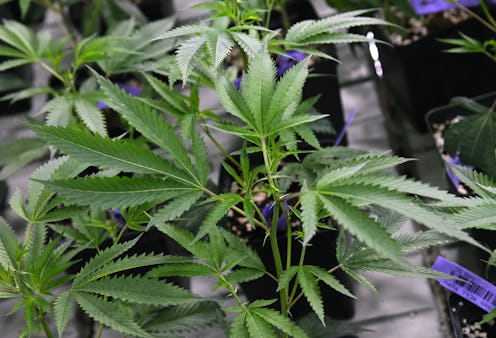News
Is Obama Harsh ... or Mellow?
Attorney General Eric Holder is expected to support a proposal that would slash the average prison sentence for drug traffickers by almost a year, Politico reported Thursday. The proposed change would affect around 70 percent of federal drug trafficking convicts, who would see their prison terms drop from 62 months to 51. The guideline won’t be voted on until April, but until it is, Holder is instructing federal prosecutors not to challenge defense attorneys who seek the reduced sentences in court.
This is just the latest of several moves on the part of the Obama administration that suggests a serious mellowing of federal drug policy. But has the administration really taken a new turn on the War on Drugs, as it claims on the official White House website? Or has it been just as harsh as its predecessors? So far, it’s been something of a mixed bag.
Harsh: Raiding Dispensaries
In 2008, Obama proclaimed “I’m not going to be using Justice Department resources to try and circumvent state laws” on medical marijuana. But at this point, that indisputably qualifies as an empty campaign promise, because over the past five years, the Obama administration has waged a severe, prolonged crackdown on state-certified marijuana dispensaries.
Under Obama, the DEA has conducted 270 raids of dispensaries, which amounts to a little over half the total amount of raids in the last 17 years. Private growers have been targeted as well, including 68-year-old Joy Greenfield, whose plants were destroyed and computers were seized by the DEA in 2009. In 2011, U.S. Attorneys sent over 500 cease-and-desist letters to dispensaries around the country, threatening them with assets forfeiture if they didn’t shutter their doors. This practice continued into 2013, and it “worked:” In California alone, at least 500 dispensaries were shut down in one eight-month period.
"There's no question that Obama's the worst president on medical marijuana," Rob Kampia, executive director of the Marijuana Policy Project, said in 2012. "He's gone from first to worst."
Mellow: Letting Colorado and Washington Do Their Thing
In 2012, both Colorado and Washington legalized recreational sales and possession of marijuana for state residents. Given the Obama administration’s record on federal drug enforcement, this would seem to make both states a prime target for federal intervention. But in mid-2013, Holder called the governors of both states and informed them that the Justice Department wouldn’t, for the time being, interfere with the state laws. In addition, Deputy Attorney General James Cole issued a memo to U.S. Attorneys across the country directing them to do the same.
Now, this could just be a temporary policy. Memos to U.S. Attorneys aren’t legally binding; a 2009 memo that suggested an easing up of marijuana enforcement policy was subsequently ignored by many U.S. Attorneys across the country, most notably Melinda Haag, who initiated the bulk of the crackdowns in California. Also, the feds did raid more than 12 medical marijuana dispensaries in Colorado before the recreational weed laws took place — but then, bizarrely, didn't arrest anybody and allowed the shops to reopen. Nevertheless, the DEA has more or less taken a hands-off approach to recreational marijuana since the laws were passed almost two years ago.
Harsh: Shutting Down Oaksterdam
In early 2012, federal agents raided Oaksterdam University, a school in Oakland, California for aspiring marijuana growers and caretakers. U.S. marshals blocked the doors to the school while IRS and DEA agents hauled off computers and documents from inside. The target of the raid was broadly understood to be not the facility itself, which reopened later in the month, but the man who ran it, Richard Lee.
Lee is one of the most prominent pro-marijuana activists in California. In addition to operating several marijuana dispensaries in Oakland, he spent more than $1 million lobbying for Proposition 19, a bailed ballot initiative that would have legalized marijuana in California, and founded Oaksterdamn in 2007. As a result of the Raid, Lee was forced to leave the university and shut down his nearby cannabis dispensaries.
The most insidious aspect of the raid was that Oaksterdam wasn’t breaking any laws; the only goal, it seems, was to intimidate a longtime marijuana advocate into forfeiting his businesses.
Mellow: Letting Banks Do Business With Weed Dealers
This was a big one. It used to be a crime for banks to do business with marijuana-related businesses, but in February, the Justice Department eliminated that restriction. This opened up the doors for dispensaries to take credit cards instead of cash, and while this is undoubtedly much more convenient for marijuana customers, it’s incredibly helpful for dispensaries as well.
The consequences of the previous ban were far-reaching. Every single aspect of a marijuana dispensary’s business had to be conducted in cash, which included things like payroll and inventory. More significantly, dispensaries had to constantly have immense amounts of cash on hand, which resulted in a much higher risk of robbery. This, in turn, meant that owners had to invest more money in security, which drove up the price of weed and made it more expensive to open up a dispensary.
But that’s a thing of the past. The change didn’t get much attention at the time, but it was probably the closest the administration will ever come to legalizing weed.
